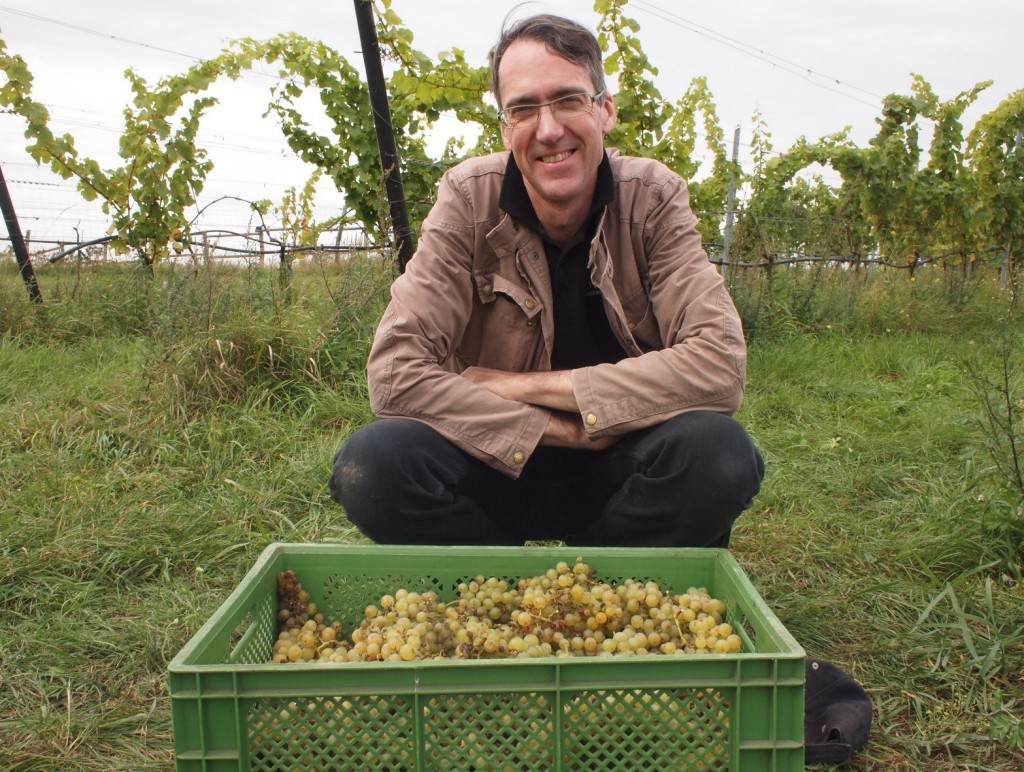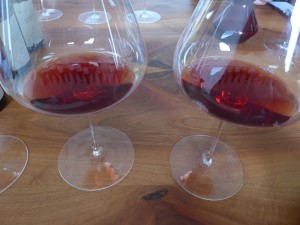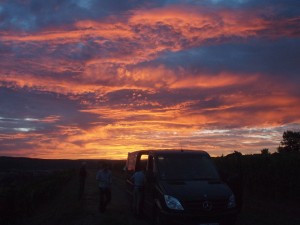 The photograph above shows me on the first day of the 2012 harvest at Weingut Klosterhof Töplitz close to Potsdam in Brandenburg/Germany. Note the poles and wires supporting the vines, also that the vines are planted in neat rows.
The photograph above shows me on the first day of the 2012 harvest at Weingut Klosterhof Töplitz close to Potsdam in Brandenburg/Germany. Note the poles and wires supporting the vines, also that the vines are planted in neat rows.
One of the purposes of this blog is to seriously stir up the shit, an American expression whose directness excites me, challenges me and drives me to action. By “seriously” I mean not only substantially, but also with serious intent and serious determination. In England, where I grew up we say that the truth will out, but anyone with even a superficial knowledge of history (American history, English history, any history) knows that sometimes it can take a long time for the truth to work its way to the surface unaided. So, it often needs the help of people like myself – some others do it better than I – in order that the shit can hit the fan.
 Today I’m writing about the association of the word natural and idea of naturalness with wine, and much else besides. Of course, I’m talking about so called “natural wines” and here I think it’s worth noting that even that great champion of this category of wine in New York Wine City (NYWC) Alice Feiring points out in her book ‘Naked Wine’ (2011, Cambridge/MA, Da Capo Press) that the word “natural” is loaded with associations and therefore problematic. She’s quite right about that, but the problems this word causes go way beyond this category of wine that has been so fashionable and controversial the last years, as I will try to show.
Today I’m writing about the association of the word natural and idea of naturalness with wine, and much else besides. Of course, I’m talking about so called “natural wines” and here I think it’s worth noting that even that great champion of this category of wine in New York Wine City (NYWC) Alice Feiring points out in her book ‘Naked Wine’ (2011, Cambridge/MA, Da Capo Press) that the word “natural” is loaded with associations and therefore problematic. She’s quite right about that, but the problems this word causes go way beyond this category of wine that has been so fashionable and controversial the last years, as I will try to show.
Sometimes practical examples are the best way to get down to untangle linguistic and philosophical knots like this. So let me tell the story of a young German couple who’s small start up winery has made some very good Pinot Noir red wines in the Baden region for about a decade. Recently a young woman with a company specialized in organic and natural wines started importing their Pinot Noirs into her Far Eastern homeland. Unusually for this blog, I’m giving her the benefit of anonymity, because I’ve neither me her, nor could I read anything she’s written due to the language problem. I’m sure that she’s very serious and also means what’s she does well, but that’s not the point of this story.
Recently the young Far Eastern wine importer visited the young German Pinot Noir  producers for the first time, and was very enthusiastic – particularly about their wines – until they took her on a vineyard tour. As they walked into the first vineyard she stopped in her tracks and said, “oh no…wire”, then mumbled something about how wire in vineyards disrupts the flow of some kind of ethereal energy field though them. Vineyards with vines planted in rows and supported by wires stretched between poles at the row ends (technical name espalier) has been the norm on Planet Wine since at least half a century, and was introduced to some winegrowing regions much earlier than that. The only reasonably common alternative to this system is bush vines with minimal support from wooden stakes (almost always in warm, dry regions) and more rarely you find steep and/or terraced where each vine is trained up its own pole (e.g. some places in the Mosel and Rhône valleys). The young German Pinot Noir producers were dumbfounded and didn’t know what to say, but later asked themselves what the alternative would be for them.
producers for the first time, and was very enthusiastic – particularly about their wines – until they took her on a vineyard tour. As they walked into the first vineyard she stopped in her tracks and said, “oh no…wire”, then mumbled something about how wire in vineyards disrupts the flow of some kind of ethereal energy field though them. Vineyards with vines planted in rows and supported by wires stretched between poles at the row ends (technical name espalier) has been the norm on Planet Wine since at least half a century, and was introduced to some winegrowing regions much earlier than that. The only reasonably common alternative to this system is bush vines with minimal support from wooden stakes (almost always in warm, dry regions) and more rarely you find steep and/or terraced where each vine is trained up its own pole (e.g. some places in the Mosel and Rhône valleys). The young German Pinot Noir producers were dumbfounded and didn’t know what to say, but later asked themselves what the alternative would be for them.
The next day they accompanied her to her appointments in Alsace, because they were really interested to find out how the organic and natural wines there tasted. You see, they aren’t against this approach, rather they’d like to find a way to further reduce the use of sulfur in their wines without compromising their ageing potential. The young Far Eastern wine merchant did the navigating, and that’s when it suddenly hit the young German Pinot Noir producers. She was navigating with her ipad using the GPS system, and, of course, she had flown to Germany from her homeland in a modern jet airliner! All of these technologies are way more advanced than the wire in vineyards. Furthermore, each of them – computer, satellite communications and jet engines – was originally developed for military purposes! And all of this is supposed not to disrupt the flow of ethereal energy fields?!
I feel a lot of sympathy for the young Far Eastern wine merchant, because this kind of inconsistency is endemic to the contemporary world, and I’m sometimes guilty of it too. However, that doesn’t alter the fact that no other idea has more woefully afflicted by our inability to think logically and consistently than natural/naturalness, though what we do to the ideas of democracy, freedom and the free market and what their twisted forms can do to us is sometimes every bit as bad.
Our fixation with the idea of Holy Nature goes back to the French-Swiss philosopher Jean-Jacques Rousseau (1712-78) who was obsessed by the idea of the natural man, writing in Part 2 of his ‘Discourse on the Origins of Inequality’ (1754) that, “nothing is so gentle as man in his primitive state, when placed by nature at an equal distance from the stupidity of the brutes and the fatal enlightenment of civil man”.
 Rousseau’s assertion of the fundamental goodness of nature was picked up by the Romantic poets, painters and thinkers, some of whom (for example the poet Wordsworth) pushed it even further than Rousseau thereby turning it to a pervasive aspect of Western Culture. During the following centuries it was cross-pollinated with ideas from Far Eastern religions, then disseminated throughout the whole world.
Rousseau’s assertion of the fundamental goodness of nature was picked up by the Romantic poets, painters and thinkers, some of whom (for example the poet Wordsworth) pushed it even further than Rousseau thereby turning it to a pervasive aspect of Western Culture. During the following centuries it was cross-pollinated with ideas from Far Eastern religions, then disseminated throughout the whole world.
The vine strikes us an inherently good plant, because we conceive of it as being natural. In doing so we forget that the modern grape varieties are all the result of selection processes stretching over untold generations (though accident also played a role). We also forget that planting vines in rows, even planting vines at all is not natural. Fermentation – a form of microbial spoilage – is natural, but the way we have influenced and adapted this process to bake leavened bread, make beer, wine and other alcoholic beverages is also not natural. These are obviously important aspects of human cultural activity, because you find them in many different cultures.
Please don’t get me wrong. I’m not arguing in favor of more processing of wine, rather for a realistic view of what winegrowing and winemaking are actually about, and for a pragmatic approach to the beverage. As Francois Mitjavile of Tertre-Roteboeuf and Roc des Cambes in Bordeaux once said of wine, “if there’s too much human influence then wine tastes boring, but if there’s only nature then the result is vinegar. Where is the right point between these extremes? It is not easy to find”. No less important for me are the words of Jim Clendenen of Au Bon Climat in Santa Maria/California, “wine is the product of the spoilage of fresh grapes under controlled conditions. A winemaker who doesn’t try to influence those conditions has abrogated his fundamental responsibility”.

![120114_riesling_global_RZ [1600x1200]](http://www.stuartpigott.de/wp-content/uploads/2013/03/120114_riesling_global_RZ-1600x120017.jpg)
Wise Words, Mr. Pigott! It indeed is very difficult to find the right way in between “making” wine (with the help of all today’s technical support) and helping the grapes to become wine. I hope you’re enjoying your journey an have much fun in NYC. Bye for now, Thorsten